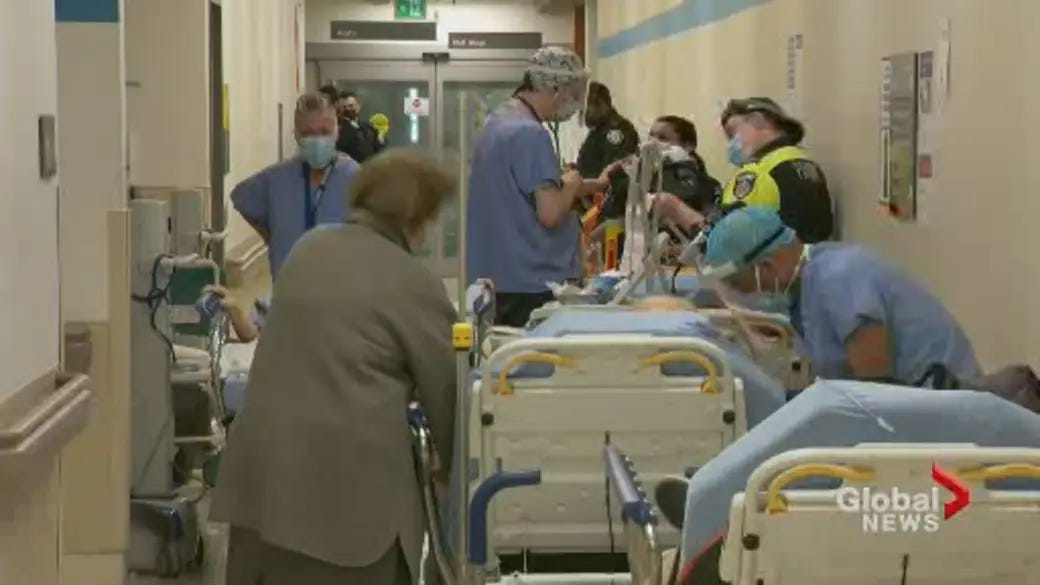The Endgame
Newsletter #57 - The kingdom of the sick (2)
Toronto, March 3, 2024
The kingdom of the sick (2)
Last week I described my recent stay at a downtown Toronto hospital. I spent four days with pneumonia in what Susan Sontag calls the kingdom of the sick. The experience was frightening and disorienting.
But there’s a positive side to the story. I saw an impressive hospital system. We are constantly told this system is in crisis, that it’s understaffed, underfunded, there are excessive wait times for everything, not enough beds, etc. etc. Many of these criticisms may have substance. But my recent experience suggests there are several things that are very right. Here are four of those things.
Kindness. During my hospital stay, I encountered an army of security guards, volunteers, orderlies, nurses, technicians, physiotherapists, occupational therapists, pharmacists, students, and doctors of different seniorities. (The hospital I was in employs about 5,000 people.) They were all dealing with unhappy, impatient, demanding, often frightened patients, some carping, some hostile, some even violent. And yet, from what I saw, the hospital staff was uniformly kind, cheerful, and encouraging. (I know there must be occasions when this is not the case. Even Homer nodded.) Where else do you find such a consistently positive attitude in difficult circumstances? In what corporation? In what government department? What’s been your experience lately complaining to your favourite telco? How are you getting on with the Canada Revenue Agency?
Diversity. A far as I could tell, the hospital staff reflected modern urban Canada as a diverse society. Women seemed to outnumber men. (The Canadian Institute for Health Information reports, “In 2019, 47.5% of family medicine physicians and 38.0% of specialist physicians in Canada were female. Since 2015, the number of female physicians in the workforce has increased by 19.2%, while the number of male physicians has increased by 5.8%.”) The team assigned to my case had nine doctors (including two students): it was headed by a woman, and six of its nine members were female. And the whole gamut of urban ethnicities was in evidence. Data on physicians from visible minorities is hard to come by, but one report estimates that “In 2000, 18 percent of Canada’s active physicians were visible minorities; by 2015 that share had risen to about 31 percent. In Ontario, the corresponding increase was from 24 percent to 39 percent.”
Efficiency. Efficient sharing of information is essential in a hospital. I found coordination and tracking of patient care to be impressively thorough. The team responsible for a patient meets frequently to discuss his or her progress. Detailed notes are kept by every professional involved. These notes, and other reports (e.g., test results), are available to the patient online. So, for example, in my own case, I can read from the comprehensive notes of Dr. X (about 1000 words) taken the night of my admission. A brief excerpt from a long report: “Patient has received antibiotics overnight; I will discontinue given confirmed viral etiology and based on timeline, superimposed bacterial pneumonia seems unlikely. However, can consider re-initiating for possible superimposed bacterial pneumonia if non-improving hypoxia or any decline in clinical status.”
Medicare. All I had to pay out-of-pocket for the care I received was $45 for the ambulance ride to emergency. (In Canada, thanks to Medicare, most health services are free at the point of delivery.) Tommy Douglas (1904-1986), premier of Saskatchewan and then leader of the New Democratic Party, is generally recognized as the father of Canadian universal health coverage. When I was discharged from hospital, I thanked the young doctor who told me the good news for the care I had received. I added enthusiastically, “Thank God for Tommy Douglas!” She looked bemused. It took me a moment or two to realize that she had no idea who he was.




Thanks for this.
I am so glad to have read your piece first this morning, This is probably the only positive news on the medicare available that I have read in the the last few years. Unfortunately the price of hospital admission is to be very ill.